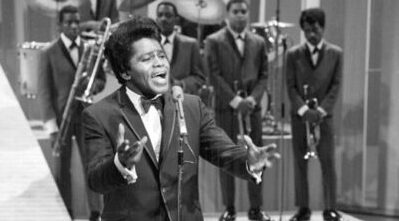on
James Brown, “The Godfather of Soul”
-
May 3
1845—Macon B. Allen passes the Massachusetts bar thus becoming the first African American lawyer to pass a state bar and the first Black person permitted to practice law in the United States. Allen was born in Indiana but after the Civil War he moved to South Carolina where he was elected a judge in 1873.
1933—Singer James Brown, known as “The Godfather of Soul” for his game-changing style in funk, soul and R&B throughout his career, was born on May, 3, 1933, in Barnwell, S.C. Brown charted on the Billboard Pop Charts close to 100 times and on the R&B charts at least 110 times. In a career that spanned six decades, Brown influenced the development of several music genres. Brown died on Dec. 25, 2006.
1949—The U.S. Supreme Court ruled in favor of J.D. Shelley on Shelley v. Kraemer, a landmark housing and civil rights case. After years of living with relatives or in rental properties, Shelley, who’d migrated from the South to St. Louis, Mo., with his family to escape racial oppression, decided to buy a house. He learned, however that many owners had agreed to a real estate contract clause that banned them from selling their homes to people of “Negro or Mongolian” descent. After Shelley finally bought a house, White homeowner Louis Kraemer hired an attorney to invalidate the contract and took the case to court. After Kraemer successfully appealed, which reversed the first court’s decision, the Shelley family took the case to the U.S. Supreme Court and won.
-
May 4
1891—Dr. Daniel Hale Williams founds the Provident Hospital and Training Center in Chicago, Ill. It becomes a major training center for Black doctors and nurses. Williams is best known, however, for performing the nation’s first open heart surgery on July 9, 1893. He operated on a man injured in a knife fight. The man would live for another 20 years after the surgery.
1961—Thirteen Freedom Riders began bus trips through the South to test Southern compliance with a 1960 U.S. Supreme Court ruling outlawing segregation in interstate transportation facilities. They were soon joined by hundreds of other “Freedom Riders” of all ages and races. Despite the Court decision, dozens of Freedom Riders were arrested as the South attempted to hang onto its segregationist ways.
-
May 5
1905—Robert Sengstacke Abbott founds the Chicago Defender newspaper calling it “the world’s greatest weekly.” Indeed, he would build the Defender into the largest circulation and most influential Black newspaper of its day. The Defender, which became the most widely circulated Black newspaper in the country, came to be known as “America’s Black Newspaper” and made Abbott one of the first self-made millionaires of African American descent. In 1919, Illinois Gov. Frank Lowden appointed Abbott to the Race Relations Commission. Abbott died of Bright’s disease in 1940 in Chicago, Ill.
-
May 6
1787—Prince Hall organizes the nation’s first Black Masonic lodge in Boston, Mass.—African Lodge #459. Hall would go on to become the father of Black Masons in America and a major Black leader in the Northeast.
1812—Martin R. Delany, a pioneering Black nationalist, is born on this day in Charles Town, Va. Abraham Lincoln once described him as one of the most brilliant men he had ever met. Delany would fight in the Civil War to end slavery and become one of the nation’s first Black military officers. After the war he became a doctor. But over the years he became frustrated with American racism and began to advocate a return of Blacks to Africa.
-
May 7
1800—On this date the founder of the settlement which would grow to become the city of Chicago, Jean Baptiste Pointe Du Sable, sold his property and left the settlement. The Haitian-born frontier trader and businessman had a history of building significant wealth, losing it and building it again. He would die 18 years later in St. Charles, Mo.
1878—Black inventor, Joseph R. Winters, receives a patent for his designing of the fire escape ladder.
2010—A report on felony disenfranchisement laws begins to receive widespread publicity. The report was actually released on April 21 by the NAACP Legal Defense and Education Fund. It showed that 5.3 million Americans were being denied the right to vote because of past felony convictions. Disproportionately, those denied voting rights were African American. In fact, the report revealed that 13 percent of Black males could not vote because of felony convictions. Historically, most voting disenfranchisement laws were enacted after the Civil War as a means to keep newly freed Blacks from voting.
-
May 8
1858—The first play by an African-American writer is published. The play was titled “The Escape” and the author was William Wells Brown.
1925—The Brotherhood of Sleeping Car Porters was founded. It would become the leading Black-led trade union organization in America. In addition to introducing unionism to African Americans, the ability to travel to cities throughout the country enabled the porters to become a major vehicle of communications for American Blacks. They distributed everything from letters to Black-oriented newspapers as they traveled the nation. The chief organizer was the legendary A. Phillip Randolph.
-
May 9
1952—Boxer-turned-actor Canada Lee dies in New York City at the age of 45. Second only to the legendary Paul Robeson, Lee was the leading serious (non-comedic) Black actor of the 1940s. He gave impressive performances in Alfred Hitchcock’s thriller “Lifeboat” (1944), the boxing classic “Body and Soul” (1947) and “Cry, The Beloved Country” (1951). However, like Robeson, Lee’s film career came to an end during the McCarthy Era when a host of Black and White stars, who were also social activists, were labeled communists and denied jobs.
Join our email list to stay connected.






